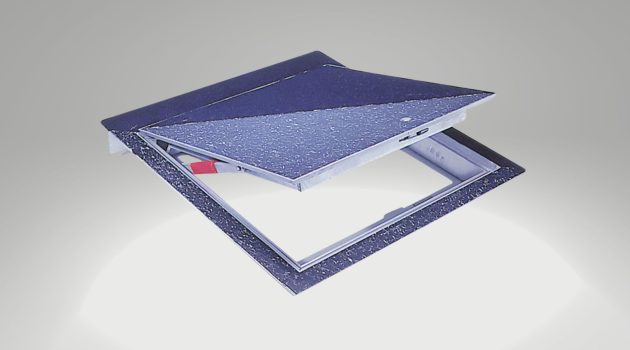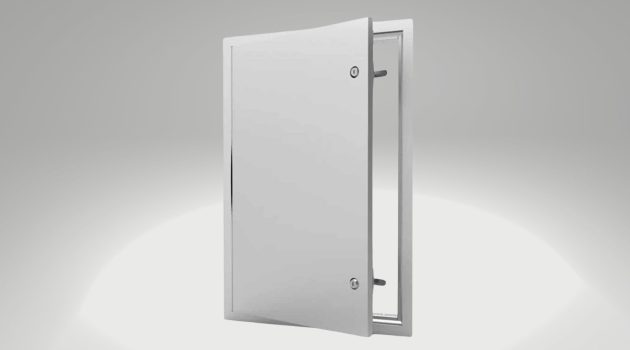Dealing with a window air conditioner that’s leaking water can be a frustrating experience.
Not only can it be messy, but it can also lead to potential damage to your home and belongings.
Understanding the causes of this issue and how to address them is essential for maintaining a comfortable and efficient living environment.
A window AC unit may often leak water due to issues such as condensation drain blockage, clogged drain lines, or dirty air filters.
These problems can be resolved with simple DIY fixes, making it important to familiarize yourself with the unit and its various components.
Regular maintenance, such as cleaning air filters and inspecting drainage systems, can help prevent future leaks and ensure the optimal performance of your air conditioner.
1. Types of Window AC Leaks
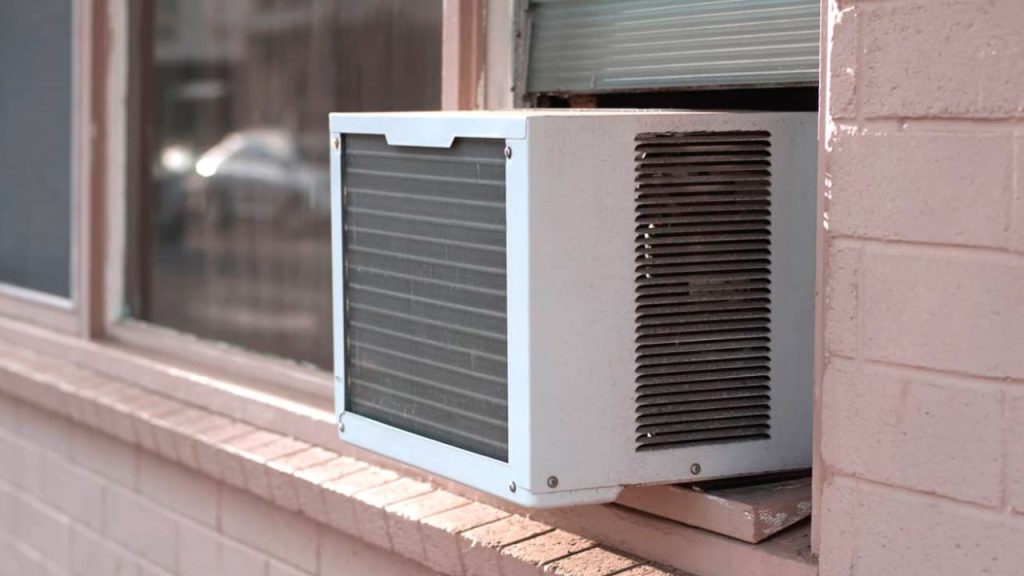
Indoor Leaks
Indoor leaks are water dripping or leaking from the AC unit inside your living space.
This can be problematic, as it can cause damage to your walls, floor, and other belongings.
There are several possible reasons why your window AC might be leaking water inside your home:
- Condensation drain blockage: This is the most common cause of indoor leaks. Over time, debris or dust can accumulate, blocking the condensation drain. To fix this, you’ll need to clean the drain to allow water to flow freely once more.
- Frozen evaporator coil: A frozen evaporator coil can cause water to leak from the AC unit. This is usually caused by restricted airflow, such as a dirty air filter. To fix this, clean or replace the air filter and ensure proper air circulation around the unit.
- Improper installation: An improperly installed window AC unit could be causing the water to flow back inside instead of draining outside. Make sure the unit is tilted slightly downwards at the outside end to facilitate proper drainage.
Outdoor Leaks
Outdoor leaks refer to water leaking or dripping from the AC unit to the exterior of your home.
While not as directly damaging to your home as indoor leaks, they can cause issues like soil erosion or create a slippery area outside your window.
Causes for outdoor leaks may include:
- Drain-pipe blockage: Similar to indoor leaks, a blocked drain pipe can cause water to leak from the AC unit. You’ll need to inspect the drain pipes for any obstruction and clean them out to solve this issue.
- Overflowing drain pan: If the drain pan is overflowing, the water isn’t properly drained away from the unit. You should clean or replace the drain pan to fix this problem.
- Excessive humidity: The AC unit may produce more moisture than usual in extremely humid conditions. This can cause the unit to leak water outside. To mitigate this, try reducing the cooling capacity of your AC to allow the unit to dehumidify the air properly.
READ MORE: Best Casement Window Air Conditioners
2. Common Problems Leading to AC Leaks
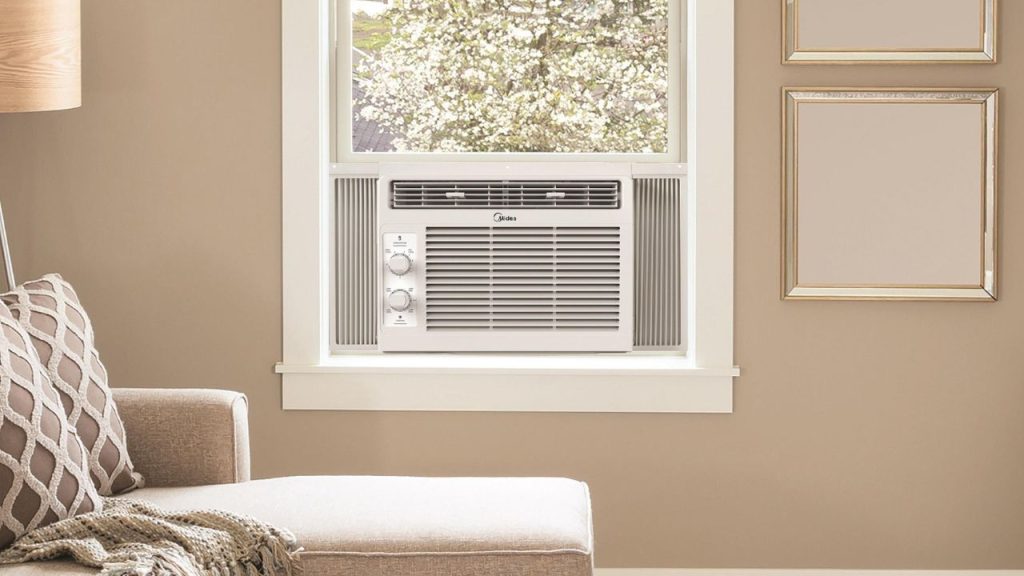
Dirty or Damaged Parts
One common cause of window AC leaks is dirty or damaged parts. Over time, dirt and dust can accumulate in various AC unit components, leading to water leaking.
For instance, a dirty air filter can restrict airflow, causing the evaporator coil to freeze; excess water might leak out when it melts.
To prevent this issue, cleaning the air filter regularly is essential.
Another potential problem is rust or corrosion on your AC’s drainage system. A cracked or corroded drain pan can cause water to leak from your unit.
Inspect the drain pan for any signs of damage; if you find any, it might be time to replace the pan.
Improper Installation
Improper installation plays a key role in window AC leaks.
If your unit isn’t installed correctly, gravity may not effectively pull water toward the drain system, and it could end up dripping inside your home.
To ensure your AC is installed properly, make sure it’s level and securely attached to the window frame.
Additionally, it might be worth checking if the correct size unit has been installed.
An oversized unit might cause short cycling, frequently turning on and off without completing a full cooling cycle.
This can lead to insufficient evaporator coil dehumidification and, consequently, leaks.
By monitoring and addressing these common problems promptly, you can help prevent leaks and keep your window AC functioning correctly and efficiently.
READ MORE: Best Rated Ventless Air Conditioners
3. Troubleshooting Window AC Leaks
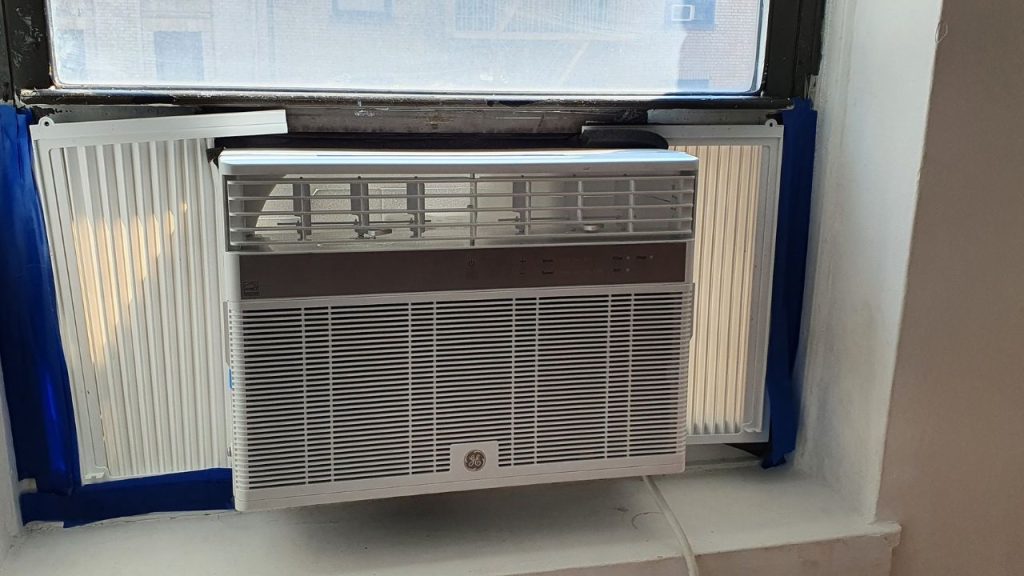
How to Detect a Leak
Detecting a leak in your window AC might seem daunting, but fear not! It’s easier than you think. Pay close attention to the following signs that may indicate a leak:
- Dripping water from the inside of your home
- Pooling water near the unit
- Unusual noises coming from the AC
- Decreased performance or efficiency
If you notice any of these signs, it’s time to investigate further and start troubleshooting the issue.
Fixing Minor Leaks
You can fix some minor leaks yourself. Here are a few simple steps to follow:
- Turn off the AC – The first thing you should always do is turn off the window AC unit. Never try to use your AC when there’s a water leak.
- Check for clogs – Inspect the condensate drain for any blockages. A clogged drain can cause water to back up and leak. You can use a small brush or a wet/dry vacuum to clear the clog.
- Inspect the evaporator coil – A frozen evaporator coil can lead to water leaks. If you find ice on the coil, thaw it by turning off the AC and running the fan-only mode. Addressing underlying issues like low refrigerant levels or dirty filters will prevent the coil from freezing again.
- Level the unit – Make sure your window AC is installed correctly and leveled. An improperly installed unit can cause water drainage issues. Adjust the angle to ensure proper water flow away from your home if necessary.
In some cases, a more severe issue may be causing your window AC to leak. If you cannot identify or resolve the problem, it’s best to contact an HVAC technician for help.
A qualified professional can help troubleshoot and fix the issue, ensuring comfort and safety.
READ MORE: How to Integrate HVAC Units Into Your Home Decor
4. Hiring a Pro for Serious AC Problems
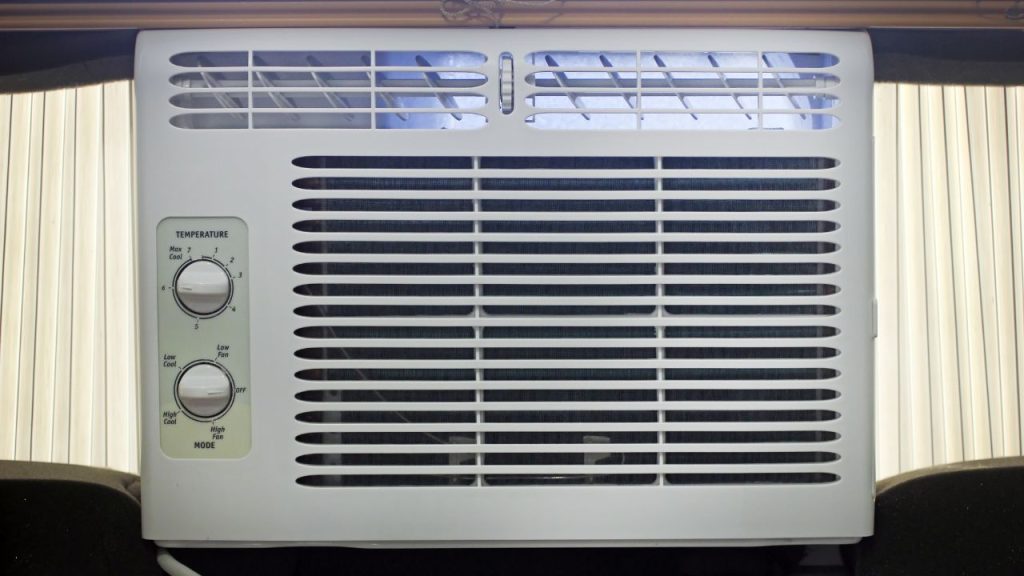
If your window AC leaks water and you’ve tried some DIY fixes, but the problem persists, it might be time to call a professional.
Hiring a pro can save you time, money, and effort in the long run, especially if your AC unit has a serious problem that requires specialized tools or knowledge to repair.
To find the right professional for your needs, ask friends, family, or neighbors for recommendations. You can also search for local HVAC technicians or service providers online.
Be sure to read customer reviews and testimonials to gauge their work’s quality and overall customer satisfaction.
Remember that a friendly and professional demeanor is essential, as this person will work in your home.
Once you have a few candidates in mind, contact each one and ask for quotes.
This will give you an idea of their pricing structure and allow you to compare costs across multiple pros.
Don’t hesitate to discuss any concerns or questions about your window AC unit and its leaking water issue.
A good professional can assess the situation, provide a diagnosis, and recommend solutions based on their expertise.
Remember that the lowest price is sometimes the best option when comparing quotes.
Please make sure the quality of the service, their expertise, and any included warranties are also considered when making your decision.
Hiring a professional who can effectively address your specific AC problem and prevent future leaks is important.
Once you’ve hired your chosen pro, be prepared to provide them with relevant information about your window AC unit, such as the make and model, when the leaking problem started, and the steps you’ve already taken to fix it.
This will help your technician understand the issue, work efficiently, and provide a thorough and lasting solution.
With a professional on the job, you can have peace of mind knowing that your window AC unit is in good hands and that the leaking water problem will soon be resolved.
Frequently Asked Questions
Why is my AC leaking water inside my home?
Your window AC unit may leak water inside your home due to a blocked condensation drain, a common cause. Other reasons include a frozen evaporator coil, a dirty air filter, or improper installation.
How can I fix a wall AC unit leaking water?
To fix a leaking wall AC unit, first, check if the condensation drain is blocked. If it is, clean the drain to allow water to flow properly. Additionally, you should inspect the evaporator coil for any signs of freezing and clean or replace the air filter if necessary. If the issue persists, consult with a professional technician.
How do I divert water dripping from a window unit?
To divert the water dripping from a window unit, use a splash guard or create a drip tray using a PVC pipe by securing it beneath your AC unit. Make sure to angle the pipe slightly downward to guide the water away from your home.
What should I do if my HVAC is leaking water on the floor?
If your HVAC leaks water on the floor, first turn off the system to prevent further damage. For possible issues, examine the condensate drain, air filter, and evaporator coil. If you cannot identify or fix the problem, contact a professional HVAC technician for proper diagnosis and repair.
Should I turn off my AC when it’s leaking water?
Yes, turning off your AC when it’s leaking water is essential since operating it under these conditions can further damage your system and property. Turning it off also allows you to safely inspect the unit for potential issues and perform any necessary repairs.


